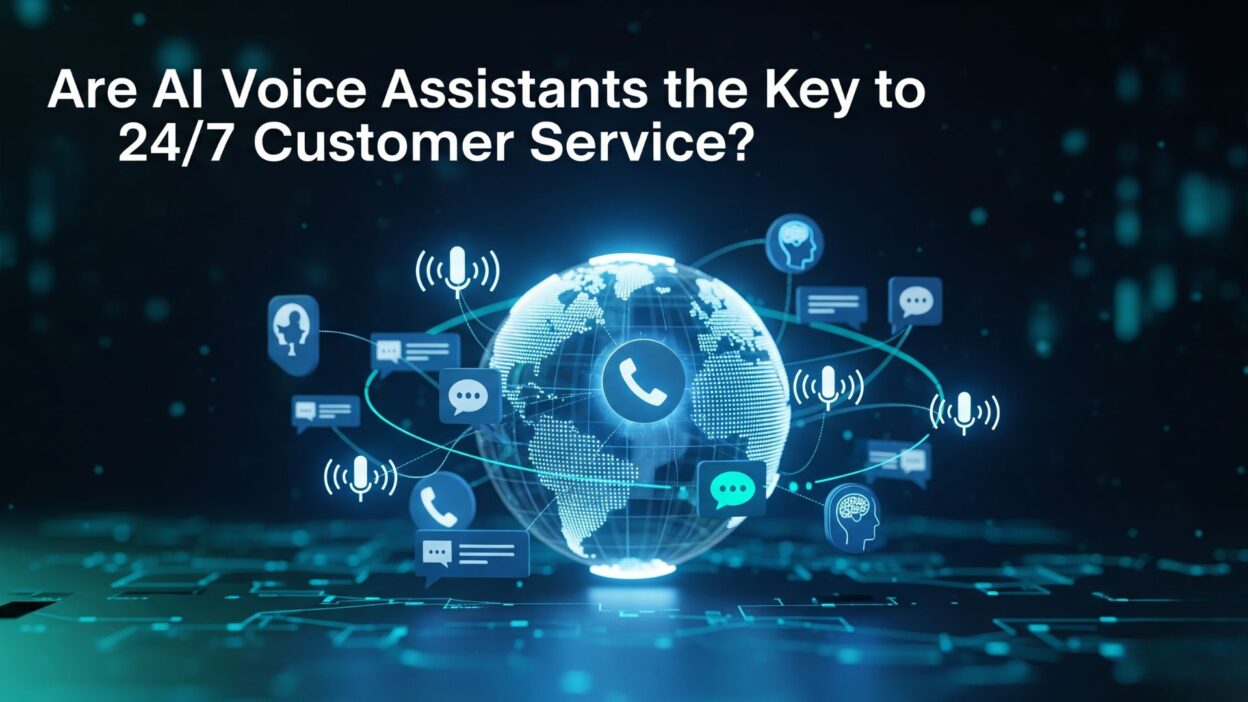TL;DR Your support team is overwhelmed. Phone lines are constantly busy. Customers are stuck in endless hold queues, becoming increasingly frustrated with every passing minute. Even with dedicated agents working overtime, response times are slow and customer satisfaction is plummeting.
Table of Contents
The root cause? Traditional phone support systems simply cannot keep pace with modern customer expectations.
In today’s instant-gratification economy, customers expect immediate assistance. They can summon rideshares instantly, receive same-day deliveries, and access information within seconds. When these same customers call your business and wait on hold for minutes—or worse, hours—their patience evaporates quickly.
According to recent studies, 67% of customers hang up the phone when they can’t reach a human agent immediately, and 75% believe it should take no more than five minutes to reach someone who can help them.
The traditional solution of hiring more staff is costly, unscalable, and misses the fundamental issue. This is where AI customer service voice assistant with 24/7 support emerges as a game-changing solution.
With instant response capabilities, intelligent conversation handling, and round-the-clock availability, AI customer service voice assistant with 24/7 support helps businesses stay responsive, reduce operational pressure, and maintain customer satisfaction at scale—all while significantly reducing costs.
In this comprehensive guide, we’ll explore why response speed has become critical for business success, the challenges traditional phone support creates, how modern AI customer service voice assistant with 24/7 support technology works, and why smart businesses are rapidly adopting this revolutionary approach to customer communications.
Why Quick Voice Responses Matter in Today’s Market
Customer expectations for phone support have fundamentally shifted. Quick responses aren’t just appreciated—they’re demanded. The on-demand economy has conditioned consumers to expect immediate assistance across all touchpoints, including voice communications.
This isn’t merely a preference; it’s the new baseline standard for acceptable customer service.
How On-Demand Culture Changed Voice Communication Expectations
From ordering food with voice commands to getting instant answers from virtual assistants like Alexa and Siri, consumers have become accustomed to immediate voice interactions. This behavioral shift now extends to business communications. If your company cannot match this pace of responsiveness, it appears outdated and inefficient.
The rise of voice-first technologies has made customers comfortable with AI-powered conversations, creating an opportunity for businesses to meet expectations while optimizing operations.
Why Instant Voice Support Matters More Than Ever
Speed in voice communications transcends convenience—it has become a fundamental business requirement. Immediate voice responses demonstrate several critical business values:
- Competitive advantage: Quick voice responses differentiate your business in crowded markets where customers have numerous alternatives
- Respect for customer time: Instant assistance shows customers their time is valued and respected
- Trust building: Immediate responses create positive first impressions that establish credibility
- Enhanced satisfaction: Fast resolution of voice inquiries directly correlates with higher customer satisfaction scores
- Improved conversion rates: Quick voice support during sales inquiries leads to faster decision-making and higher conversion rates
- Sustained engagement: In our distraction-filled world, immediate voice responses keep customers engaged rather than losing them to competitors
What Poor Voice Response Times Actually Cost Businesses
Companies that fail to implement AI customer service voice assistant with 24/7 support face significant consequences that extend far beyond customer frustration:
- Direct revenue loss: Delayed voice responses result in abandoned calls and lost sales opportunities
- Reputation damage: Poor phone support leads to negative reviews and damaged brand perception
- Customer churn: Research shows 89% of customers switch to competitors after poor voice support experiences
- Increased operational costs: Manual phone handling requires expensive human resources and infrastructure
- Missed opportunities: Slow voice responses during peak times result in lost leads and reduced market capture
- Agent burnout: Overwhelmed phone agents provide inconsistent service quality and experience higher turnover rates
Challenges Businesses Face with Traditional Voice Support Systems
Even with the best intentions and significant investments, many businesses struggle to deliver fast, consistent voice support. These operational challenges compound over time, significantly impacting customer satisfaction and business growth.
Limited Working Hours and Coverage Gaps
Traditional phone support relies entirely on human agents working fixed schedules, creating significant coverage gaps. Without AI customer service voice assistant with 24/7 support, businesses miss countless opportunities:
- After-hours inquiries: Customers calling outside business hours receive no assistance
- Weekend and holiday gaps: Extended periods without voice support create customer frustration
- Time zone challenges: Global businesses struggle to provide consistent voice support across multiple time zones
- Emergencies: Critical customer issues occur outside normal business hours when human agents aren’t available
Consumer research indicates that 64% of customers expect businesses to be available 24/7 for voice support, and 73% are more likely to purchase from companies offering round-the-clock voice assistance.
Overflowing Voice Queries During Peak Times
Traditional phone systems buckle under high call volumes, creating cascading problems:
- Extended hold times: Peak periods result in unacceptable wait times that frustrate customers
- Abandoned calls: Long hold times lead to high call abandonment rates and lost business opportunities
- Agent overload: Human agents become overwhelmed, leading to rushed interactions and reduced quality
- System failures: Traditional phone infrastructure struggles with high concurrent call volumes
AI customer service voice assistant with 24/7 support eliminates these constraints by handling unlimited simultaneous conversations without degradation in response quality or speed.
Delays Caused by Manual Call Handling
Traditional voice support workflows depend heavily on human intervention, creating multiple points of delay:
- Call routing delays: Manual call distribution takes time and often results in misrouted calls
- Knowledge retrieval: Human agents must search for information, creating hold times
- Transfer delays: Moving calls between agents or departments introduces significant waiting periods
- Documentation time: Manual note-taking and ticket creation slows down resolution processes
Pressure on Agents and Inconsistent Voice Responses
When human agents handle high call volumes, several quality issues emerge:
- Inconsistent information: Different agents may provide varying answers to similar questions
- Emotional variability: Human agents have good and bad days, affecting interaction quality
- Fatigue impact: Tired agents provide lower-quality support and make more mistakes
- Training variations: Different skill levels among agents lead to inconsistent customer experiences
An AI customer service voice assistant offers 24/7 support with consistent, high-quality responses, no matter the call volume, time of day, or other conditions.
How AI Voice Assistants Work in Customer Service
AI customer service voice assistant with 24/7 support represents a convergence of artificial intelligence, natural language processing, and voice recognition technologies. These systems have evolved far beyond simple automated phone trees to become intelligent conversational partners capable of handling complex customer interactions.
Understanding how this technology works helps businesses appreciate its transformative potential and implementation possibilities.
Breaking Down the Basics of AI Voice Assistants
At their core, AI customer service voice assistant with 24/7 support systems process spoken language in real-time, understand customer intent, access relevant information, and provide appropriate voice responses. This process happens in milliseconds, creating seamless conversational experiences that feel natural and helpful.
The technology combines several advanced capabilities:
- Speech recognition: Converts spoken words into text with high accuracy across different accents and speech patterns
- Natural language processing: Analyzes text to understand meaning, context, and intent behind customer requests
- Knowledge retrieval: Accesses business databases, documentation, and systems to find relevant information
- Response generation: Creates appropriate, contextual responses that address customer needs
- Voice synthesis: Converts text responses back into natural-sounding speech
- Learning algorithms: Continuously improves performance based on interaction patterns and outcomes
How AI Voice Assistants Differ from Human Agents
| Aspect | Human Agents | AI Voice Assistants |
| Availability | Limited to work schedules and shifts | True 24/7 availability with no breaks |
| Response Speed | Variable, depends on knowledge and workload | Consistent sub-second response times |
| Scalability | Limited by headcount and physical capacity | Handles unlimited simultaneous calls |
| Consistency | Performance varies with mood, fatigue, training | Delivers identical quality every interaction |
| Emotional Intelligence | Natural empathy and emotional understanding | Programmed empathy with consistent tone |
| Complex Problem Solving | Excel at nuanced, complex problem resolution | Best for routine inquiries with escalation capabilities |
| Cost Structure | Ongoing salary, benefits, and training costs | One-time setup with usage-based pricing |
| Multi-tasking | Handle one call at a time | Process multiple conversations simultaneously |
Types of AI Customer Service Voice Assistants
Interactive Voice Response (IVR) Enhanced Systems: These upgrade traditional phone trees with natural language understanding, allowing customers to speak requests instead of navigating complex menu systems.
Conversational Voice Assistants: Advanced systems that engage in natural dialogue, understand context across multiple exchanges, and handle complex multi-step processes through voice interaction.
Hybrid Voice Solutions: Sophisticated platforms that seamlessly blend AI automation with human agent capabilities, providing the best of both worlds through intelligent call routing and context preservation.
Comprehensive Capabilities of AI Customer Service Voice Assistants
AI customer service voice assistant with 24/7 support has evolved from simple automated responses to sophisticated conversational systems that actively manage complex customer relationships across industries. These systems now handle real customer conversations with the same effectiveness as experienced human agents.
What makes these voice assistants exceptionally capable is their integration of advanced natural language processing, machine learning, and business system integration. They don’t just respond with pre-recorded messages—they understand customer needs and adapt their responses accordingly, learning from each interaction to improve future conversations.
Here’s how AI customer service voice assistant with 24/7 support is transforming business communications:
Instant Voice Response: Customers connect immediately without hold times. AI voice assistants answer calls instantly, providing immediate assistance that meets modern expectations for rapid service delivery.
True 24/7 Availability: Unlike human-staffed call centers, AI customer service voice assistant with 24/7 support never closes. Customers receive consistent service quality whether calling at 2 PM or 2 AM, on weekends, or during holidays.
Unlimited Concurrent Call Handling: During peak periods, promotional campaigns, or emergency situations, AI voice assistants manage thousands of simultaneous calls without performance degradation or increased wait times.
Contextual Understanding: Advanced natural language processing enables AI voice assistants to understand customer intent, recognize emotions in speech patterns, and adapt responses accordingly for more personalized interactions.
Seamless System Integration: AI customer service voice assistant with 24/7 support connects directly to CRM systems, order management platforms, knowledge bases, and business applications, providing customers with real-time, accurate information during voice conversations.
Intelligent Call Routing: When human intervention is necessary, AI voice assistants seamlessly transfer calls to appropriate human agents while preserving conversation context and customer information.
With these advanced capabilities, businesses don’t just improve response times—they transform their entire customer service approach while reducing operational costs and improving customer satisfaction scores.
Real-World Impact: How Leading Companies Use AI Voice Assistants
Top global brands have integrated AI customer service voice assistant with 24/7 support into their operations not to follow technology trends, but because these systems solve fundamental business challenges like slow response times, inconsistent service quality, and overwhelming support costs.
From telecommunications to financial services, AI voice assistants now handle millions of customer calls with speed, accuracy, and consistency that exceeds traditional human-only approaches.
Telecommunications: Verizon’s AI Voice Revolution
Verizon implemented AI customer service voice assistant with 24/7 support across their customer service operations, handling account inquiries, service troubleshooting, and billing questions through natural voice conversations. Their AI system processes technical support requests, guides customers through device setup procedures, and manages service changes without human intervention.
The results: 40% reduction in average call handling time and 60% improvement in first-call resolution rates.
Financial Services: Bank of America’s Voice AI Success
Bank of America’s AI voice assistant manages account inquiries, transaction disputes, and financial product information through sophisticated voice interactions. The system handles sensitive financial conversations while maintaining strict security protocols and regulatory compliance.
Customer satisfaction scores increased by 35% while operational costs decreased by 50% for routine voice inquiries.
Retail: H&M’s Voice Commerce Integration
H&M integrated AI customer service voice assistant with 24/7 support for order tracking, product availability checks, and customer service inquiries. Customers can call to check inventory, modify orders, and receive personalized product recommendations through natural voice conversations.
This implementation resulted in 25% higher customer retention rates and 30% faster order resolution times.
Travel: AirAsia’s Multilingual Voice Support
AirAsia’s AI voice assistant communicates fluently in multiple languages, handling booking modifications, flight status inquiries, and travel assistance requests. The system processes complex travel scenarios while maintaining consistent service quality across different languages and cultural contexts.
The airline achieved a 45% reduction in call center costs while improving customer satisfaction scores by 28%.
E-commerce: Amazon’s Voice-Enabled Customer Service
Amazon utilizes AI customer service voice assistant with 24/7 support for order inquiries, delivery questions, and account management. Their voice system integrates with vast product databases and logistics networks to provide real-time, accurate information during customer calls.
This approach has enabled Amazon to scale customer service operations efficiently while maintaining high satisfaction rates across millions of daily customer interactions.
Industry-Specific Applications of AI Voice Assistants
AI customer service voice assistant with 24/7 support adapts to unique industry requirements, compliance standards, and customer expectations. Different sectors leverage voice AI technology to solve specific challenges while improving operational efficiency.
Order Tracking and Shipping Inquiry Management
Retail and E-commerce: AI voice assistants provide real-time order status updates, delivery tracking information, and shipping modification options through natural voice conversations. Customers can call to check delivery dates, modify shipping addresses, or resolve delivery issues without waiting for human agents.
Benefits: Instant access to shipping information, reduced call center volume, and improved customer satisfaction during the critical post-purchase experience.
Product and Service Information Delivery
Technology Companies: AI voice assistants handle technical support inquiries, product feature explanations, and troubleshooting guidance through voice interactions. Customers receive step-by-step assistance for complex technical issues without navigating complicated support documentation.
Healthcare: Voice assistants provide appointment scheduling, prescription refill requests, and basic health information while maintaining HIPAA compliance and protecting patient privacy.
Appointment Management and Follow-Up Coordination
Professional Services: Law firms, consulting companies, and service providers use an AI customer service voice assistant with 24/7 support for appointment scheduling, consultation bookings, and follow-up coordination. The system manages calendars, sends confirmations, and handles rescheduling requests automatically.
Medical Practices: Healthcare providers leverage voice assistants for appointment scheduling, prescription refill coordination, and patient follow-up calls, reducing administrative burden while improving patient communication.
Payment Processing and Financial Transaction Support
Financial Services: Banks and credit unions use AI voice assistants for account inquiries, payment processing, transaction disputes, and financial product information. These systems maintain strict security protocols while providing convenient voice-based banking services.
Subscription Services: Companies with recurring billing models use voice assistants to manage subscription changes, payment method updates, and billing inquiries through conversational voice interfaces.
Addressing Common Concerns About AI Voice Assistant Implementation
Many businesses hesitate to implement an AI customer service voice assistant with 24/7 support due to legitimate concerns about customer acceptance, technology limitations, and operational challenges. Let’s address these concerns with factual information and practical solutions.
Will Customers Accept AI Voice Assistant Interactions?
Modern consumers have become increasingly comfortable with AI-powered voice interactions through smartphones, smart speakers, and virtual assistants. Research shows that 73% of customers are willing to interact with AI voice systems when they provide fast, accurate assistance.
The key factors for customer acceptance include:
- Immediate response times: Customers prefer AI voice assistants that answer instantly over waiting in human agent queues
- Accurate information: When AI systems provide correct, helpful information, customers appreciate the efficiency
- Natural conversation flow: Advanced AI voice assistants engage in natural dialogue rather than rigid, robotic interactions
- Transparent AI identification: Customers respond positively when AI systems identify themselves as automated assistants
Can AI Voice Assistants Understand Human Speech Intent?
Modern AI customer service voice assistant with 24/7 support utilizes advanced natural language processing and machine learning algorithms that have achieved remarkable accuracy in understanding human speech patterns, intent, and context.
Current capabilities include:
- Accent recognition: AI systems understand various regional accents and speech patterns with 95%+ accuracy
- Intent classification: Advanced algorithms identify customer needs from natural speech with high precision
- Context awareness: AI voice assistants maintain conversation context across multiple exchanges
- Emotional recognition: Systems can detect frustration, satisfaction, or confusion in voice patterns and adapt responses accordingly
What Happens When AI Voice Assistants Make Mistakes?
While AI technology is highly advanced, errors can occur. However, well-designed AI customer service voice assistant with 24/7 support systems include multiple safeguards:
- Confidence scoring: AI systems recognize when they’re uncertain and escalate to human agents
- Learning algorithms: Mistakes become training opportunities that improve future performance
- Fallback procedures: Clear escalation paths ensure customers receive appropriate assistance when AI limitations are reached
- Human oversight: Hybrid models combine AI efficiency with human expertise for complex situations
How Do AI Voice Assistants Handle Complex Customer Inquiries?
AI customer service voice assistant with 24/7 support excels at routine inquiries and standardized processes, but complex situations require intelligent handling:
- Automatic escalation: AI systems recognize complex scenarios and seamlessly transfer to human agents
- Context preservation: When escalating, AI provides complete interaction history to human agents
- Partial resolution: AI can handle routine aspects of complex inquiries, reducing workload for human agents
- Continuous learning: Complex inquiries become training data for expanding AI capabilities over time
The most effective approach combines AI efficiency for routine matters with human expertise for complex problem-solving, creating optimal customer experiences across all inquiry types.
Implementation Strategy and Business Impact
Successful deployment of AI customer service voice assistant with 24/7 support requires strategic planning, proper integration, and performance measurement. Businesses that approach implementation systematically achieve faster ROI and higher customer satisfaction improvements.
The transformation from traditional phone support to AI-powered voice assistance represents a fundamental shift in how businesses manage customer communications. This change affects operational workflows, staff responsibilities, and customer experience strategies.
Leading companies report three consistent outcomes from AI voice assistant implementation: reduced operational costs, improved customer satisfaction scores, and enhanced scalability for business growth. These benefits compound over time as AI systems learn from interactions and optimize performance continuously.
The implementation process typically follows a structured approach that minimizes disruption while maximizing benefits. Businesses start with clearly defined use cases, integrate with existing systems, train AI models on company-specific data, and gradually expand capabilities based on performance results.
Most organizations see measurable improvements within 30 days of deployment, with full ROI typically achieved within 90 days through reduced labor costs, increased customer satisfaction, and improved operational efficiency.
Measuring Success and Return on Investment
AI customer service voice assistant with 24/7 support delivers measurable business value across multiple key performance indicators that directly impact profitability and customer relationships.
Quantifiable Business Metrics
Response Time Improvements: AI voice assistants provide sub-second response times compared to traditional phone systems with average wait times of 2-5 minutes. This improvement directly correlates with reduced call abandonment rates and higher customer satisfaction scores.
Cost Reduction Analysis: Businesses typically achieve 60-80% reduction in customer service operational costs by implementing AI voice assistants. The pay-per-use pricing model (starting at $0.10 per minute) provides predictable costs that scale with business growth rather than requiring fixed staffing expenses.
Availability Enhancement: True 24/7 support availability increases customer touchpoint opportunities by 300-400%, enabling businesses to capture inquiries that would otherwise be lost during off-hours.
Scalability Metrics: AI voice assistants handle unlimited simultaneous calls during peak periods, eliminating the capacity constraints that limit traditional phone systems. This scalability supports business growth without proportional increases in support infrastructure.
Customer Experience Impact Measurement
Satisfaction Score Improvements: Organizations implementing AI customer service voice assistant with 24/7 support typically see 25-40% improvements in customer satisfaction scores due to faster response times and consistent service quality.
First-Call Resolution Rates: AI voice assistants achieve 70-85% first-call resolution rates for routine inquiries, compared to 60-70% rates for human-only systems, reducing customer frustration and operational overhead.
Customer Retention Benefits: Improved voice support experiences directly impact customer retention rates, with businesses reporting 15-25% improvements in customer lifetime value following AI voice assistant implementation.
Future-Proofing Your Business with AI Voice Technology
The adoption of AI customer service voice assistant with 24/7 support positions businesses for long-term success in an increasingly competitive marketplace where customer experience differentiation becomes crucial for sustainable growth.
Voice AI technology continues evolving rapidly, with improvements in natural language understanding, emotional intelligence, and system integration capabilities. Early adopters benefit from competitive advantages while building operational expertise that compounds over time.
Investment in AI voice assistant technology represents strategic preparation for future customer expectations and market conditions. As voice-first interactions become standard across industries, businesses with established AI voice capabilities will maintain competitive advantages over organizations relying solely on traditional support methods.
The technology infrastructure developed for AI customer service voice assistant with 24/7 support also enables future innovations in customer communication, sales automation, and business process optimization, creating a foundation for ongoing digital transformation initiatives.
Read More: Voice Bot Productivity Gains: Staff Free for Revenue Activities
Conclusion

The evidence is clear: AI customer service voice assistant with 24/7 support have evolved from experimental technology to essential business infrastructure. Companies that embrace this transformation gain immediate operational benefits while positioning themselves for sustained competitive advantage.
Traditional phone support systems cannot meet modern customer expectations for immediate, consistent, always-available assistance. The gap between customer demands and traditional capabilities continues widening, making AI voice assistant adoption not just beneficial but necessary for business survival.
The implementation process has become streamlined and accessible, with professional setup services, proven integration methods, and predictable ROI timelines that minimize risk while maximizing benefits. Most businesses achieve positive returns within 30 days through reduced costs and improved customer satisfaction.
Customer acceptance of AI voice interactions has reached mainstream levels, with research consistently showing preference for immediate AI assistance over delayed human contact. This trend will accelerate as voice AI technology continues improving and customer familiarity increases.
The question for business leaders isn’t whether to implement AI customer service voice assistant with 24/7 support, but how quickly they can deploy these systems to capture competitive advantages and meet escalating customer expectations.
Fast, consistent, always-available voice support has become table stakes for business success. AI voice assistants make this level of service achievable and affordable for organizations of all sizes.
Frequently Asked Questions
Will Customers Feel Like They’re Talking to a Real Person?
While AI customer service voice assistant with 24/7 support technology have advanced significantly, these systems are designed to be helpful and efficient rather than deceptive. The best AI voice assistants clearly identify themselves as automated systems while providing natural, conversational interactions that focus on solving customer problems quickly and accurately.
Modern customers generally prefer fast, accurate assistance over waiting for human agents, regardless of whether the initial interaction is with AI or humans. The key is ensuring AI voice assistants provide valuable help and seamlessly escalate to human agents when necessary.
How Secure Are AI Voice Assistants with Customer Data?
Security represents a top priority for AI customer service voice assistant with 24/7 support implementations. Leading platforms maintain SOC2, HIPAA, GDPR, and TCPA compliance standards that meet or exceed traditional phone system security requirements.
AI voice assistant platforms typically include end-to-end encryption, secure data storage, regular security audits, and comprehensive access controls. Customer conversation data remains encrypted and protected throughout processing and storage, with strict protocols governing data access and retention.
How Do I Measure AI Voice Assistant Performance and ROI?
Measuring AI customer service voice assistant with 24/7 support performance requires tracking both operational metrics and customer experience indicators. Key performance indicators include response times, call resolution rates, customer satisfaction scores, cost per interaction, and system availability percentages.
ROI measurement combines cost savings from reduced human agent requirements with revenue benefits from improved customer satisfaction, increased availability, and enhanced scalability. Most businesses track metrics through integrated analytics dashboards that provide real-time performance visibility and trend analysis.
Successful implementation typically shows positive ROI within 30-90 days through measurable improvements in operational efficiency, customer satisfaction scores, and cost reduction compared to traditional phone support systems.






[…] evaluating how do small businesses choose the best AI voice assistant, the answer depends on specific business requirements, technical infrastructure, and growth […]